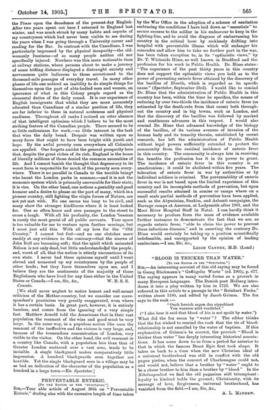by the War Office in the adoption of a scheme
of sanitation embracing the conditions I have laid down as "essentials" to secure success to the soldier in his endeavour to keep in the fighting-line, and to avoid the disgrace of embarrassing his country in the critical hour by recklessly drifting into hospital with preventable illness which will endanger his comrades and allow him to take no further part in the war, has been taken exception to, in its "optimistic views," by Dr. T. Whiteside Hime, so well known in Bradford and the profession for his work in Public Health. Dr. Hime states : "The experience of the past thirty years in this country does not support the optimistic views you hold as to the power of preventing enteric fever attained by the discovery of the bacillus of Eberth, which is regarded as its specific cause" (Spectator, September 23rd). I would like to remind Dr. Hime that the administration of Public Health in this country has been, within the time he specifies, the means of reducing by over two-thirds the incidence of enteric fever (as estimated by the death-rate from that cause) both through- out the country and in big towns, such as London, and that the discovery of the bacillus was followed by marked and continuous advances in this respect. I would also remind Dr. Hime that advanced knowledge of the biology of the bacillus, of its various avenues of invasion of the human body and its tenacity therein, established by recent research, has left the administration of Public Health without legal powers sufficiently extended to protect the community from the residual incidence of enteric fever in this country. The community is always late in receiving the benefits the profession has it in its power to grant. The incidence of enteric fever in this country is an anachronism ; it could be abolished within five years. The toleration of enteric fever in war by authorities or by individual soldiers is criminal. The preventability of enteric fever in war is not based upon the limited experience of this country and its incomplete methods of prevention, but upon successful results attained in armies or camps where on a small scale partial methods of prevention have been applied, such as the Abyssinian, Suakim, and Ashanti campaigns, the Barrage camps at Assouan, at Ladysmith after 1901, and the Mooi River Hospital Staff in Natal. I can hardly think it necessary to produce from the mass of evidence available further instances to demonstrate the fact that we are, as regards enteric fever, "able to claim the power to prevent these infectious diseases," and in asserting the contrary Dr. Hirue would certainly be taking up a position scientifically indefensible, and unsupported by the opinion of leading sanitarians.—I am, Sir, &e., LEIGH CANNEY, M.D. (Loud.)














































 Previous page
Previous page